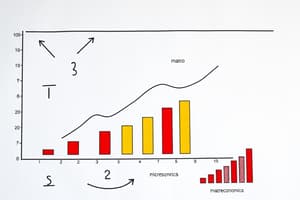Podcast
Questions and Answers
Which of the following correctly identifies the main objectives of an economy?
Which of the following correctly identifies the main objectives of an economy?
- For whom it will be produced? (correct)
- How to Produce? (correct)
- What to Produce? (correct)
- Where to Produce?
Which factor of production is defined as 'assets'?
Which factor of production is defined as 'assets'?
- Organization
- Capital (correct)
- Labor
- Land
What is the main critique of the Classical School of Thought regarding its definition of economics?
What is the main critique of the Classical School of Thought regarding its definition of economics?
- It emphasizes social welfare too heavily.
- It neglects the importance of human needs. (correct)
- It focuses on technology over wealth.
- It ignores environmental concerns.
According to the Neo-Classical School of Thought, economics is defined as the 'Science of Material Welfare'. What is a major criticism of this view?
According to the Neo-Classical School of Thought, economics is defined as the 'Science of Material Welfare'. What is a major criticism of this view?
The Modern School of Thought characterizes wants as unlimited and recurring. What is a defining feature of resources in this context?
The Modern School of Thought characterizes wants as unlimited and recurring. What is a defining feature of resources in this context?
What are the characteristics of wants as described by the Modern School of Thought?
What are the characteristics of wants as described by the Modern School of Thought?
What distinguishes microeconomics from macroeconomics?
What distinguishes microeconomics from macroeconomics?
Which statement accurately reflects an aspect of economics being both a science and an art?
Which statement accurately reflects an aspect of economics being both a science and an art?
What is a defining characteristic of the factors of production?
What is a defining characteristic of the factors of production?
Which statement best describes the primary focus of the Neo-Classical School of Thought?
Which statement best describes the primary focus of the Neo-Classical School of Thought?
What does the Modern School of Thought imply about resources?
What does the Modern School of Thought imply about resources?
In the context of economics, what does the term 'satiable' mean regarding wants?
In the context of economics, what does the term 'satiable' mean regarding wants?
According to the Classical School of Thought, what component of society was significantly overlooked?
According to the Classical School of Thought, what component of society was significantly overlooked?
Which statement best reflects the distinction between microeconomics and macroeconomics?
Which statement best reflects the distinction between microeconomics and macroeconomics?
What criticism is directed towards the Neo-Classical School of Thought?
What criticism is directed towards the Neo-Classical School of Thought?
Which of the following definitions best aligns with economics being described as both a science and an art?
Which of the following definitions best aligns with economics being described as both a science and an art?
Flashcards
Economic Growth
Economic Growth
Increase in the level of output of goods and services in an economy.
Full Employment
Full Employment
A situation where nearly all available labor resources are being utilized.
Price Stability
Price Stability
A state in which the general price level in an economy does not change much over time.
Equitable Distribution of Income
Equitable Distribution of Income
Signup and view all the flashcards
Balance of Payments Stability
Balance of Payments Stability
Signup and view all the flashcards
Factors of Production
Factors of Production
Signup and view all the flashcards
Economics Definition
Economics Definition
Signup and view all the flashcards
Microeconomics
Microeconomics
Signup and view all the flashcards
Macroeconomics
Macroeconomics
Signup and view all the flashcards
Factors of Production Defined
Factors of Production Defined
Signup and view all the flashcards
Neo-Classical Focus
Neo-Classical Focus
Signup and view all the flashcards
Scarcity of Resources
Scarcity of Resources
Signup and view all the flashcards
"Satiable" Defined
"Satiable" Defined
Signup and view all the flashcards
Classical School Oversight
Classical School Oversight
Signup and view all the flashcards
Micro vs. Macro
Micro vs. Macro
Signup and view all the flashcards
Modern Economics
Modern Economics
Signup and view all the flashcards
Study Notes
Objectives of an Economy
- The main objectives of an economy include:
- Economic growth
- Full employment
- Price stability
- Equitable distribution of income
- Balance of payments stability
Factors of Production
- Assets are considered a factor of production, specifically as capital, meaning they can be used to produce goods or services.
Classical School of Thought
- The Classical School of Thought defines economics as the study of wealth creation and distribution.
- A main critique is that this definition is too narrow, neglecting the aspects of human welfare and resource scarcity.
Neo-Classical School of Thought
- The Neo-Classical School of Thought defines economics as the "science of material welfare."
- This definition is criticized for focusing too heavily on material goods and not considering intangible aspects of welfare, such as social well-being.
Modern School of Thought
- The Modern School of Thought defines economics as the study of how individuals make choices under scarcity.
- It characterizes wants as unlimited and recurring, while resources are limited and have alternative uses.
- This implies that resources are scarce and have alternate uses, meaning there is always a trade-off when allocating resources.
Characteristics of Wants
- Wants are unlimited and recurring in nature, implying that individuals will always desire more goods and services.
Microeconomics vs. Macroeconomics
- Microeconomics studies the behavior of individual economic units, such as households and firms.
- Macroeconomics analyzes the behavior of the overall economy, including national income, inflation, and unemployment.
Economics as a Science and Art
- Economics is described as both a science and an art because:
- It uses scientific methods to analyze economic phenomena, but also
- Requires judgment and creativity in applying economic principles to real-world situations.
Defining Characteristic of Factors of Production
- Factors of production are inputs used to produce goods and services, and they are essential for economic activity.
Focus of the Neo-Classical School of Thought
- The Neo-Classical School of Thought primarily focuses on individual decision-making in resource allocation and consumer behavior.
Modern School of Thought on Resources
- The Modern School of Thought emphasizes that resources are scarce, meaning limited in supply, and therefore must be allocated efficiently.
"Satiable" in Economics
- In economics, "satiable" refers to a want that can be fully satisfied. However, most wants are thought to be insatiable.
Classical School Overlooked Component
- The Classical School of Thought significantly overlooked human welfare, focusing primarily on wealth creation and distribution.
Distinction between Microeconomics and Macroeconomics
- Microeconomics examines individual economic units, while macroeconomics focuses on the economy as a whole.
Critique of Neo-Classical School of Thought
- The Neo-Classical School of Thought is criticized for being overly focused on individual rationality and market equilibrium, neglecting social and environmental issues.
Economics as Science and Art Definition
- Economics can be described as both a science and an art because it uses scientific methods to study economic phenomena but also requires judgment and creativity to apply theoretical knowledge to real-world problems.
Studying That Suits You
Use AI to generate personalized quizzes and flashcards to suit your learning preferences.




